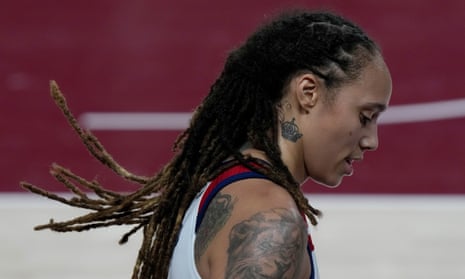She is without question the most dominant female basketball player of her generation, the uncommon 6ft 9in center with an 88in wingspan who dunks and blocks shots with spite. In the past decade Brittney Griner ignited Baylor’s undefeated college national championship run, helped USA Basketball to a pair of Olympic gold medals, and lifted the WNBA’s Phoenix Mercury to a league title just one year after being drafted first overall. And now the Houston native’s glittering career could come to an end inside a Russian jail cell.
On Saturday came word that the 31-year-old Griner had been detained at an airport near Moscow after customs agents said they caught her with a hoard of vape cartridges containing hashish oil. Even more distressing than this news breaking some three weeks after Griner had landed in Sheremetyevo from New York was the 10-year maximum prison sentence that Russia reserves for the crime she is alleged to have committed. On Sunday the secretary of state, Antony Blinken, offered oblique support for Griner, saying “we of course stand ready to provide every possible assistance.” The Texas Democratic congresswoman Sheila Jackson Lee called for her immediate release. Meanwhile, a former top Pentagon official feared Griner could become a “high-profile hostage” and be used as a bargaining chip.
Griner embodies much of what Vladimir Putin despises about the west. Set aside the fact that Griner was coming to Russia after representing the US in the Fiba World Cup qualifying, she’s a lesbian who isn’t just married to a woman, but for the second time. She is also gender non-conforming, Black and an activist who has lent her considerable stature to the various social justice protests her WNBA peers have championed. In the Sheremetyevo airport CCTV footage released by the Russian customs officials over the weekend Griner appears in a “Black Lives for Peace” jumper as dogs sniff her bags and agents unpack their contents.
But if the idea of flying to Russia in wartime seems unwise – setting aside the alleged hash oil, the state department had been warning Americans to stay away since January – well, the depressing economic realities of women’s basketball didn’t really give Griner much choice.
A seven-time all-star and two-time defensive player of the year, Griner is one of the WNBA’s “max players”, the designation for stars who earn the league’s maximum salary of $222,000. As reasonable as that might seem for a few months’ work, it’s tipping money compared with the NBA, where stars clear more than $40m a season and the minimum a rookie can take home is $925,258. For the better part of 25 years, the WNBA has operated as an NBA subsidiary on shoestring budgets. But as WNBA teams have changed hands, new-school owners have strained the league’s minimalist business model.
Keeping stars of Griner’s magnitude confined to the strictures of the WNBA’s limited budgets is a bit like forcing a 6ft 9in body into an economy seat on a commercial flight – which is exactly what the WNBA insists its players do. The league fined the New York Liberty $500,000 last fall for secretly chartering flights to travel to some games during the 2021 season, a luxury the league’s collective bargaining agreement deems a competitive advantage, Howard Megdal revealed in SI.com last week. And while the league and the owners disagree over what exactly led to their star players travelling in less style and comfort than they did as college players, what’s not in dispute is WNBA salaries not being near high enough to dissuade players from taking second jobs in Turkey, South Korea and farther-flung locales during the fall and winter.
Last year alone, more than 60% of the WNBA’s rostered players competed overseas during the offseason, many trading the comforts of home and downtime with family for big money. And no country has proven more willing to splurge on a splashy American hoops rental than Mother Russia, where oligarch-backed teams can pay whatever their patrons are willing to spend.
In 2008, after being passed over yet again for USA Basketball’s Beijing Olympics team, San Antonio Stars all-star Becky Hammon signed a four-year, $2m contract with CSKA Moscow that included a six-figure bonus for becoming a naturalised citizen and medaling at the Games. Hammon, who was branded a traitor while leading Russia to bronze, would’ve been making around $95,000 in the WNBA at the time. In January, she returned to the WNBA as a coach of the Las Vegas Aces – for a league-high $1m salary that reopened old wounds about the low pay for players.
In 2015 UMMC Ekaterinburg, a mining firm-sponsored pro team backed by the billionaire Iskander Makhmudov, paid the Phoenix Mercury’s Diana Taurasi $1.5m – 15 times her WNBA salary – to sit out the WNBA season. Griner supported the decision. “This is a chance for her to set herself up financially, and her family,” she told the Arizona Republic. She and Taurasi haven’t just been teammates for all of nine years of Griner’s WNBA career. After her rookie season she followed Taurasi on to UMMC Ekaterinburg and, together, lifted them to three national championships and four EuroLeague crowns. It was that commitment, which reportedly pays Griner $1.5m a season, that put her on that flight to Sheremetyevo.
Now she sits in detention, awaiting her fate. And it’s as yet unclear how much Makhmudov, who is on the state department’s sanctions list, can help. Suffice to say, if Griner were born a man, she wouldn’t have these problems. She’d be home.
